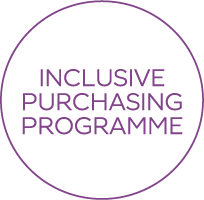Involving the Group’s suppliers in CDP Water Security programme
As part of its sustainability programme, L’Oréal has been a member of CDP Water Security programme since it was launched in 2013.
2023 saw the tenth edition of CDP Water Security programme take place. As such, L’Oréal selected 348 suppliers based on three criteria:
- technology or activity consuming particularly large amounts of water;
- location of at least one production site in a high water stress area; and
- the size of L’Oréal’s purchase volumes.
265 of them agreed to take part in the programme and Group experts gave them individual results summarising the opportunities they acted on and the areas for improvement to be addressed. L’Oréal encourages its suppliers to measure, report and set water consumption reduction targets for each production site by deploying a water-related risk assessment and management system.
At the end of 2023, suppliers fulfilling this commitment to CDP Water security represented 49% of selected suppliers’ expenses. Their average score was “B”.
C/ Using the Group’s purchasing power to serve social inclusion
The objectives of L’Oréal for the Future express the conviction that reducing the environmental footprint of products has to be accompanied by an improvement in their social and societal benefit.
Thanks to its many industrial and administrative sites worldwide, L’Oréal is strongly involved in the life of the local communities. As a company committed to demonstrating strong corporate citizenship, L’Oréal builds good relations with the local communities and strives to share its growth with them.
The Group joins forces with its suppliers to develop its positive impact programmes and promote a more inclusive society. By 2030, Inclusive Sourcing will have helped to achieve L’Oréal’s goal of enabling 100,000 additional people who are socially or economically vulnerable to access employment.

In 2023,93,165 peopleaccessed work through L’Oréal’s Inclusive Purchasing programme, 12,027morepeople than in 2020.

Launched in 2010, L’Oréal’s global Inclusive Sourcing programme(1)Launched in 2010, L’Oréal’s Inclusive Sourcing programme is referred to as Solidarity Sourcing in previous years’ reports. harnesses the Group’s purchasing power to promote social inclusion. L’Oréal allocates part of its total purchasing volume to suppliers that provide employment and a sustainable income to people who are generally excluded from the labour market. In all regions of the world in which L’Oréal is present, the programme supports:
- companies that employ people from economically vulnerable communities. These communities are identified with reference to the Group‘s DE&I policy: for example, people with a disability, senior citizens, refugees etc. Local authority guidelines are also considered where relevant(2)(2) Definition of vulnerable geographic zones: for example, rural regeneration areas, priority urban neighbourhoods [QPV] in France. as well as international standards such as Women-Owned Businesses as defined by the WeConnect guidelines; and
- companies that struggle to access major international callsfor tenders.
By applying fair trade principles in their sourcing strategy, the Group’s Raw Materials Purchasing teams enable a positive social impact while integrating the challenges of responsible agricultural practices, environmental protection and biodiversity.
L’Oréal leads fair and sustainable procurement projects in Morocco, for products such as olive oil and botanicals such as saffron and pomegranate that are grown in community gardens in Ourika. These programmes mean the Group can obtain essential ingredients while delivering a positive impact on nature and the neighbouring communities.
Through its Inclusive Sourcing programme, L’Oréal has commitments it shares with its suppliers that relate to the four pillars of the Group’s Diversity, Equity and Inclusion policy:
Socio-economic and multicultural diversity:
- Social impact is central to discussions between the Group’s purchasers and their suppliers. In each country, they identify communities that are economically and socially disadvantaged and undertake to give them access to employment(3)For example: people from the poorest communities in Pakistan and India. In Brazil, people identified by a NGO working in the favelas. People recruited by temporary work integration enterprises (Entreprises de travail temporaire d’insertion – ETTI) in France.
- Helping refugees find work is a commitment the Group shares with its suppliers. In Poland, for example, more than 50 Ukrainian refugees work full-time as employees of a major supplier in this area, producing POS advertising materials.
- New technologies constitute a strong driver of inclusion. In France, L’Oréal works with an inclusive company on its strategic transformation projects. Long-term jobseekers carry out tests and provide IT support, and develop key skills for their future employability.
